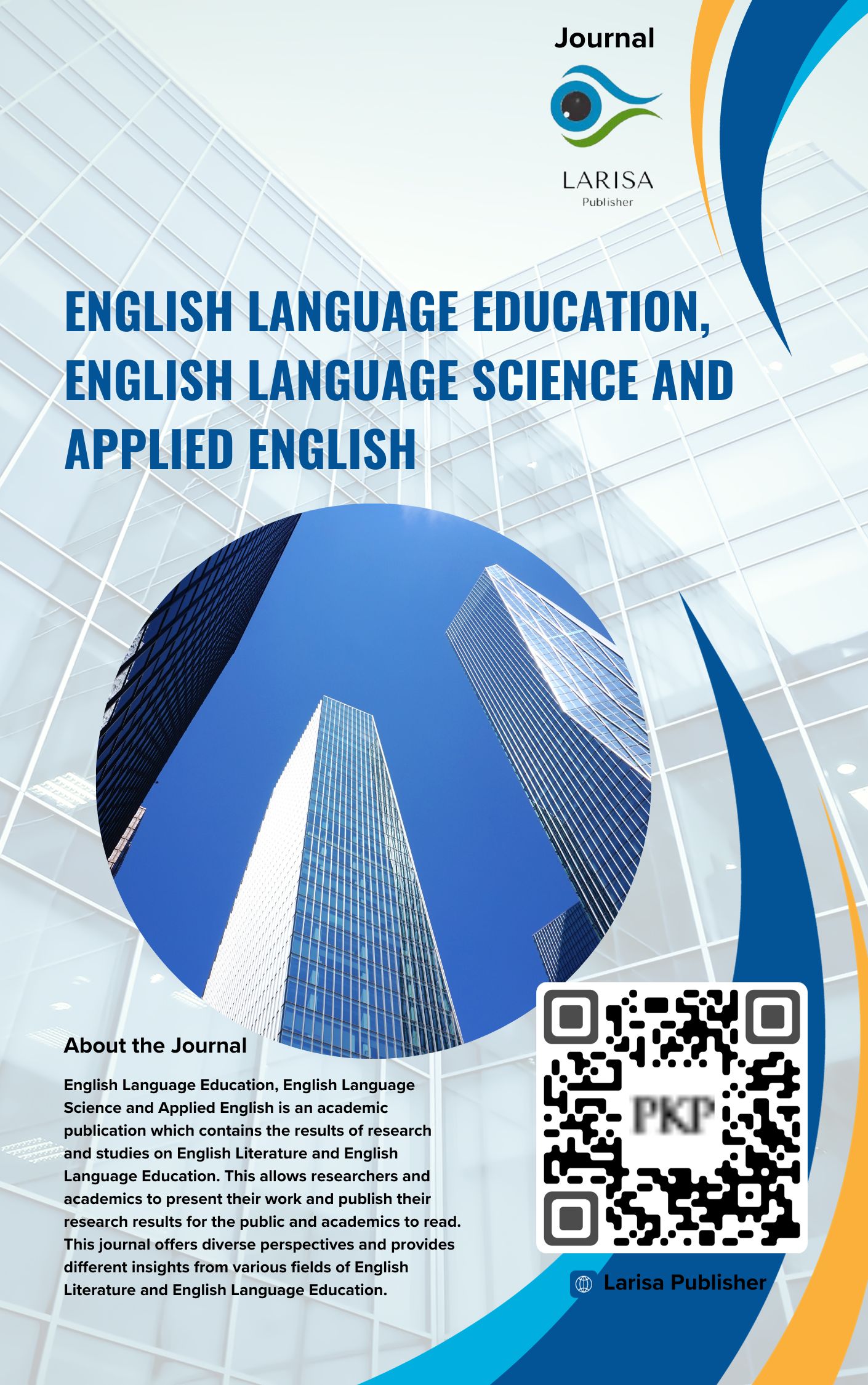Teacher’s Challenges on Implementing Independent Curriculum In English Language Teaching SMA Almursyidiyah 01 Kokop
Kata Kunci:
English teachers, Independent Curriculum, ELTAbstrak
Modifikasi pada kurikulum baru berdampak pada para pengajar, karena mereka perlu beradaptasi dengan kurikulum baru, khususnya kurikulum otonom akibat pergeseran dalam pemahaman tugas pembelajaran yang perlu diselesaikan. Penelitian dilakukan di SMA Almursyidiyah01 Kokop. Peneliti menggunakan teknik kualitatif, termasuk wawancara dan observasi sebagai alat penelitian. Analisis yang digunakan terdiri dari tiga langkah: reduksi data, tampilan data, dan verifikasi. Disarankan agar para guru mengikuti pelatihan dan pengembangan profesional, meningkatkan kemampuan pribadi, serta melaksanakan penilaian formatif dan umpan balik. Kementerian Pendidikan dan Kebudayaan akan melaksanakan distribusi pelatihan kurikulum mandiri secara adil dan menyediakan panduan bagi pengajar di setiap sekolah
Unduhan
Referensi
Anwar, K., Ubaidillah, M. F., & Sulistiyo, U. (2020). Exploring EFL Teachers’ Classroom Management: The Case of Indonesian Remote Secondary Schools. Journal of Language and Education, 6(3), 22–35. https://doi.org/10.17323/jle.2020.10549
Ayun, Q., & Yunus, M. (2017). The Efficacy of Reciprocal Teaching Method In Teaching Reading Comprehension to EFL Students. ELT Echo : The Journal of English Language Teaching in Foreign Language Context, 2(2), 134. https://doi.org/10.24235/eltecho.v2i2.2174
Creswell, J. W., & Poth, C. N. (2016). Qualitative Inquiry Research Design. SAGE Publications Asia-Pacific Pte.
Daga, A. T. (2020). Philosophical Foundation of Curriculum Development of Primary Teacher Education Study Program at STKIP Weetebula Southwest Sumba East Nusa Tenggara. Proceedings of the 4th International Conference on Learning Innovation and Quality Education, 1–7. https://doi.org/10.1145/3452144.3452151
Eden, R.-F. (2014). Phonological features of Basilectal Philippine English: An exploratory study. International Journal of English and Literature, 5(6), 128– 140. https://doi.org/10.5897/IJEL2014.0586
Ekawati, Y. N. (2017). English Teachers' Problems In Applying The 2013 Curriculum. English Review: Journal of English Education, 6(1), 41. https://doi.org/10.25134/erjee.v6i1.769
Hakim, A. R., & Nabila, M. (2022). Implementation of The Independent Learning Curriculum in Cirebon District. Journal of Sosial Science, 3(5), 1207–1213. https://doi.org/10.46799/jss.v3i5.438
Hendar, Heryono, H., Kuraesin, U., Nurohmah, H., & Novitasari, R. (2022). Perception of The Academic Community of Language Faculty Towards The Curriculum of Independent Learning-Independent Campus (MBKM). English Journal Literacy Utama, 6(2), 560–566. https://doi.org/10.33197/ejlutama.vol6.iss2.2022.181
Islam, R. (2017). Investigating Factors that Contribute to Effective Teaching-Learning Practices: EFL/ESL Classroom Context. English Language Teaching, 10(4), 15. https://doi.org/10.5539/elt.v10n4p15
Lauder, A. F. (2020). English in Indonesia. In K. Bolton, W. Botha, & A. Kirkpatrick (Eds.), The Handbook of Asian Englishes (1st ed., pp. 605–627). Wiley. https://doi.org/10.1002/9781118791882.ch26
Lian, A., & Yunus, M. (2018). Transformative reading pedagogies: Perspectives from Indonesia. International Conference The Future of Education (p. 1). Florance: The Future of Education 2019.
Miguel, J., Caballé, S., & Xhafa, F. (2017). Trustworthiness modeling and methodology for secure peer-to-peer e-Assessment. In Intelligent Data Analysis for e-Learning (pp. 49–81). Elsevier. https://doi.org/10.1016/B978-0- 12-804535-0.00004-6
Nasution, S. W. (2022). Asesment Kurikulum Merdeka Belajar Di Sekolah Dasar. MAHESA Research Center, 1, No 1.
Park, M., & Sung, Y.-K. (2013). Teachers’ perceptions of the recent curriculum reforms and their implementation: What can we learn from the case of Korean
Waode hamsina,( developing student speaking ability through story completion ) journal of englosh language vol,5 no,1 juni 2018 pp 58
M arif Rahman hakim,nike anggraini,andri saputra “ techniquie walk in improving students speaking skills”journal of linguistic and English teaching vol 4 no 1 april 2019pp6
Omwirhiren,EM (2015) enhacing academic achievement and retention in senior secondary school chemistry through discussion and lecture method: A case study of some selectedbsecondary schools in gboko,benue state,Nigeria.jouenal of education and practice,6(21), 155-162
Kusmaningsih , citra 2012 the effectiviness of communicative group activity in theaching speaking viewed on students risk taking,in second semester student of STKIP Pontianak at academic year 2011/1012.
Kemendikbudristek. (2022). Dimensi, Elemen, dan Subelemen Profil Pelajar Pancasila pada Kurikulum Merdeka. 1–37. Merdeka, K., Sekolah,
D., Nurcahyono, N. A., & Putra, J. D. (2022). Hambatan Guru Matematika Dalam Mengimplementasikan. 6(September), 377–384.
Nur, H. M., & Fatonah, N. (2022). Paradigma Kompetensi Guru. Jurnal PGSD UNIGA, 1(1), 12–16.
Bahar, H., & Herli, Sundi, V. (2020). Merdeka Belajar Untuk Kembalikan Pendidikan Pada Khittahnya. PROSIDING SAMASTA Seminar Nasional Bahasa Dan Sastra Indonesia, 115–122.
Hidayat, R., Susanto, F., Rahayu, E. M., Nungki, A., Soelistijowati, J. O., P, C. F. I., Inggris, P. B.,
Pgri, U., & Buana, A. (2022). KURIKULUM MERDEKA perkembangan dan perubahan dari waktu ke waktu sesuai dengan tantangan zaman . Oleh Sistem pendidikan yang handal juga menjadi tumpuan penting bagi terciptanya peserta didik sebagai generasi penerus yang tidak saja mampu berpikir secara . II(2), 351–363.
Indarta, Yose, Nizwardi Jalinus, Agariadne Dwinggo Samala, Afif Rahman Riyanda, and Novi Hendri Adi. 2022. “Relevansi Kurikulum Merdeka Belajar Dengan Model Pembelajaran Abad 21 Dalam Perkembangan Era Society 5 . 0.” Edukatif: Jurnal Ilmu Pendidikan 4(2):3011–24
Permatasari, K. G. (2021). Problematika pembelajaran matematika di sekolah dasar/ madrasah ibtidaiyah. Jurnal Ilmiah Pedagogy, 17(1), 68–84. http://www.jurnal.staimuhblora.ac.id/ind ex.php/pedagogy/arti cle/view/96
Rasam, F., Sari, A. I. C., & Karlina, E. (2019). Peran Kompetensi Dalam Meningkatkan Kinerja Guru Di Sma Jakarta Selatan. Research and Development Journal of Education, 6(1), 41. https://doi.org/10.30998/rdje.v6i1.4371
Suhandi, A. M., & Robi’ah, F. (2022). Guru dan Tantangan Kurikulum Baru: Analisis Peran Guru dalam Kebijakan Kurikulum Baru. Jurnal Basicedu, 6(4), 5936–5945. https://doi.org/10.31004/basicedu.v6i4.317
Herlambang, Y. T. (2016). Guru dan Tantangan Kurikulum Baru: Analisis Peran Guru dalam Kebijakan Kurikulum Baru – Awalia Marwah Suhandi, Fajriyatur Robi’ah DOI : https://doi.org/10.31004/basicedu.v6i4.317
Ananda, A. P., & Hudaidah, H. (2021). Perkembangan Kurikulum Pendidikan di Indonesia dari Masa ke Masa. SINDANG: Jurnal Pendidikan Sejarah dan Kajian Sejarah, 3(2), 102- 108.
Direktorat Jenderal Pendidikan Advokasi. (2022). Kemendikbudristek Luncurkan Kurikulum Merdeka dan Platform Merdeka Mengajar. Acara Merdeka Belajar Episode 15. Jakarta: Dikjen Dikti. Dikutip dari https://vokasi.kemdikbud.go.id.
Fadlillah. (2014). Implementasi Kurikulum 2013 dalam Pembelajaran SD/MI, SMP/MTs, SMA/MA. Yogyakarta: AR-RUZZ MEDIA. Helmi, J. (2015).
Kompetensi Profesionalisme Guru. AL-ISHLAH: Jurnal Pendidikan, 7(2), 318- 336. Lince, L. (2022). Implementasi Kurikulum Merdeka untuk Meningkatkan Motivasi Belajar pada Sekolah Menengah Kejuruan Pusat Keunggulan. Prosiding Seminar Nasional Fakultas Tarbiyah dan Ilmu Keguruan IAIM Sinjai 2022, 38-49. Sinjai Utara: FTIK Institut Agama Islam Muhammadiyah Sinjai.
Mahrus. (2021). Manajemen Kurikulum & Pembelajaran dalam Sistem Pendidikan Nasional. JIEMAN: Journal of Islamic Educational Management, 3(1), 41-80. Mulyasa, E. (2009). Standar Kompetensi dan Sertifikasi Guru. Bandung: PT.Remaja Rosdakaya.
Rahayu, D. V., Muhtadi, D., & Ridwan, I. M. (2022). Pedagogical Content Knowledge Guru dalam Pembelajaran Matematika Daring. MOSHARAFA: Jurnal Pendidikan Matematika, 11(2), 281-292.
Slameto. 2003. Belajar dan Faktor-Faktor yang Mempengaruhinya. Jakarta: Rineka Cipta. Undang-Undang Dasar Republik Indonesia Nomor 20 tahun 2003 tentang Sistem Pendidikan Nasional. (2003). Jakarta.
Usman, M., U. (2006). Menjadi Guru Profesional. Bandung: PT. Remaja Rosda Karya
Unduhan
Diterbitkan
Terbitan
Bagian
Lisensi

Artikel ini berlisensiCreative Commons Attribution-ShareAlike 4.0 International License.
Lisensi
Lisensi Creative Commons
Jurnal di publikasi oleh English Language Education, English Language Science and Applied English berlisensi Creative Commons Attribution-ShareAlike 4.0 International License
Anda bebas untuk:
Bagikan — menyalin dan mendistribusikan ulang materi dalam media atau format apa pun
Beradaptasi — remix, ubah, dan kembangkan materi untuk tujuan apa pun, bahkan secara komersial
Di bawah ketentuan berikut:
Atribusi — Anda harus memberikan kredit yang sesuai, memberikan tautan ke lisensi, dan menunjukkan jika ada perubahan. Anda dapat melakukannya dengan cara apa pun yang wajar, tetapi tidak dengan cara apa pun yang menunjukkan bahwa pemberi lisensi mendukung Anda atau penggunaan Anda.
Berbagi Serupa — Jika Anda mencampur, mengubah, atau membuat berdasarkan materi, Anda harus mendistribusikan kontribusi Anda di bawah lisensi yang sama seperti aslinya
Tidak ada batasan tambahan — Anda tidak boleh menerapkan ketentuan hukum atau tindakan teknologi yang secara hukum membatasi orang lain untuk melakukan apa pun yang diizinkan oleh lisensi














